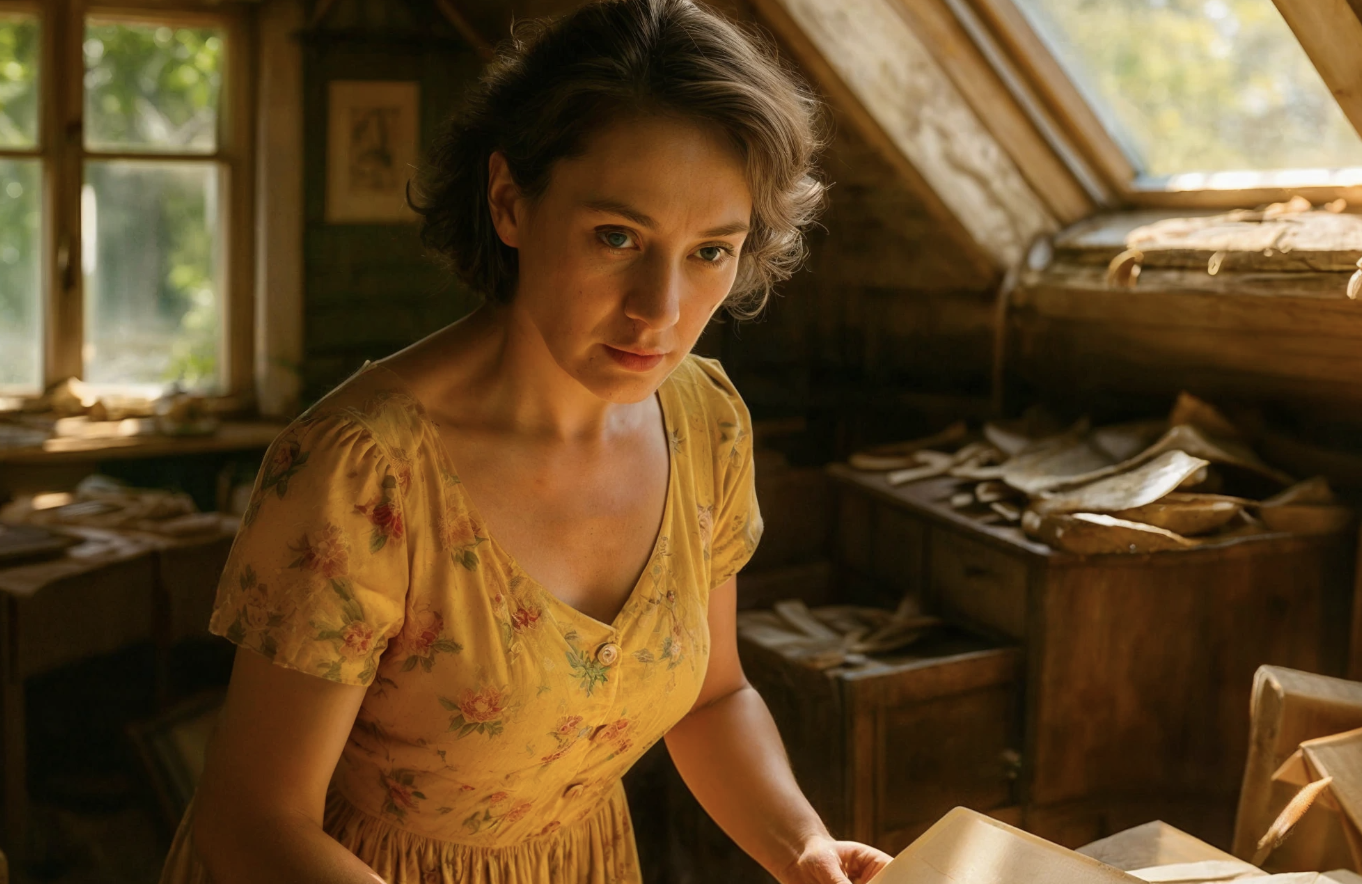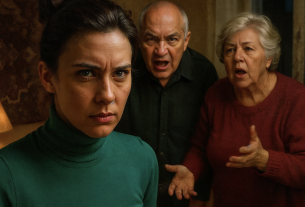I found out about the cheating by accident. No, there was no lipstick on the collar or someone else’s perfume—much more banal than that. His phone buzzed on the kitchen table while he was in the shower, and I glanced at the screen without thinking. “Miss you, kitty. When will we see each other?” wrote some Kristina, with a little heart at the end.
Fifteen years of marriage turned to dust in a second.
I didn’t throw a fit, didn’t hurl things, didn’t scream. I quietly put the phone back, sat at the table, and waited for Igor to come out of the bathroom. When he appeared in his robe, towel-drying his hair, I calmly asked:
“Who is Kristina?”
He froze. The towel slowly slipped from his hands. I saw everything on his face: guilt, fear, confusion. And then—something I never expected to see—relief.
“Lena, I wanted to tell you,” he began, and I understood that this was the end. Not the beginning of a conversation, but the end of our life together.
It turned out Kristina was twenty-eight. She worked at his company as a marketer. Young, ambitious, without “unnecessary baggage from the past,” as Igor put it. They’d been seeing each other for six months. He “hadn’t planned to drag it out,” but “didn’t know how to tell me.”
“I want a divorce,” he said, and there wasn’t a drop of regret in his voice.
I nodded silently. What else was there to do?
Igor had prepared for the divorce in advance. As it turned out, a year before I even learned about the affair. The apartment in the city center where we’d lived for the past ten years had been transferred to his mother’s name. The car—also. Our joint savings had somehow evaporated, and proving they’d existed at all was virtually impossible.
Only one thing was in my name—a country house in the village of Sosnovka, a hundred kilometers from the city. We’d bought it a year earlier, and it had been my idea. I fell in love with that house at first sight: a two-story wooden structure with carved window frames, high ceilings, and huge windows. The house was built at the beginning of the last century and carried the spirit of that era. It did, however, need serious repairs—the roof leaked, the floors creaked, the plaster was crumbling.
Igor agreed to the purchase only because the house cost peanuts. “We’ll sell it later,” he’d said then. And now, sitting in the lawyer’s office, he smirked:
“Well then, Lenka, take your museum piece. Just keep in mind the repairs will cost a fortune. Where are you going to get the money on your freelancing?”
He laughed. His lawyer—expensive, in a designer suit—smiled condescendingly, too. And I kept quiet, signing the papers. Let them think I’m the victim. Let them savor their victory.
I got what I wanted. That very house.
I moved to Sosnovka at the end of April. Spring was only just taking hold—the trees were turning a tender green, the old apple trees in the garden were in bloom, the air was filled with the scent of freshness and new life.
The house greeted me with creaking floorboards and the smell of damp. But even in that state it was beautiful. The high ceilings, the huge windows, the wooden staircase to the second floor with carved banisters—all of it breathed history.
I hired a local crew—three men who agreed to help with the renovations for a reasonable price. We started with the roof. Then the walls, the floors, the wiring. The work progressed slowly but surely.
One day, while I was clearing out the attic, tossing decades of accumulated junk, I came across an old chest. It stood in the farthest corner, under a layer of dust and cobwebs. Inside were stacks of yellowed newspapers, a few books, old photographs and… paintings.
Several canvases and dozens of sketches, drawings, watercolor miniatures. I’m no art historian, but even I could tell this wasn’t just daubing. Every line, every brushstroke showed remarkable skill. Landscapes, portraits, scenes from life—everything breathed talent.
On some of the works there were signatures in the corner, but I couldn’t make them out. The paint had faded, the paper had decayed. I carefully put everything back in the chest and asked the workers to carry it downstairs.
That evening I called my former classmate Marina. She worked as an art historian at the city museum and knew painting well. I told her about the find, and she lit up:
“Lena, bring everything to me. I’ll take a look.”
A week later I was sitting in Marina’s office, watching as she, wearing white gloves, examined each painting, each sketch. Her face grew more focused, her eyes shone.
“Lena,” she finally exhaled, setting aside another canvas. “Do you understand what you’ve found?”
I shook my head silently.
“These are works by Vasily Polenov, Isaac Levitan, Konstantin Korovin. Look, this signature—this is definitely Levitan. And this sketch… My God, this could be an early Serov. I need to run an expert evaluation, but Lena, if these are originals—and I’m ninety percent sure they are—then this is an enormous treasure. This is millions.”
I felt the ground go out from under me. Millions? For old paintings that had been lying in an attic?
“How did they get there?” Marina asked, still not taking her eyes off the pictures.
“I have no idea. The house is old, built in the early twentieth century. Maybe the previous owners were collectors or… or artists themselves?”
Marina nodded.
“Possibly. Many noble families collected art back then. After the revolution and during the repressions, people hid valuables wherever they could. The owners of your house probably stashed these works and never managed to come back for them. Later the house changed hands, and the new owners simply didn’t know there was a fortune in the attic.”
The expert evaluation took two months. Marina brought in specialists from the capital, and every day I lived in tense anticipation. Meanwhile, I continued the renovation. The workers finished the roof and walls and started laying new floors. I stripped old wallpaper myself, painted frames, washed windows.
The house was transforming before my eyes. It seemed to come alive, returning to its former splendor. In a neighboring town I found a restorer who agreed to bring the old furniture back to life; it had been stored in the attic and the shed. A carved sideboard, an inlaid dresser, chairs with curved legs—all of it got a second life.
I worked to exhaustion, but I was happy. For the first time in many years, I felt free. No one criticized me for “pointless expenses,” mocked my love of antiques, or told me I was “living in the past.”
And then Marina called.
“Lena, sit down. I have news.”
The evaluation confirmed the authenticity of the works. In the chest were twelve paintings and more than fifty sketches and drawings by renowned Russian artists of the late nineteenth and early twentieth centuries. The preliminary valuation of the collection was around forty million rubles. Possibly more.
I cried as Marina told me. I cried out of happiness, relief, and the realization that life can, in fact, be fair.
I sold two paintings—the most valuable—and used the proceeds to finish the house, furnish it with antiques, and lay out the garden. I kept the rest of the works. Marina helped register them as a private collection, and now they hang in a specially equipped room on the second floor.
The house became my refuge, my joy. I stopped taking new freelance jobs and started to write. It turned out I’m pretty good at it. I finished my first novel in six months, and a publishing house picked it up right away.
Life settled. I was happy.
And then Igor showed up.
It happened at the end of summer. I was sitting on the veranda with a cup of tea, reading, when I heard a car pull up. I looked up and saw a familiar black SUV.
Igor got out of the car and froze, taking in the house. I saw his face change—surprise, admiration, bewilderment.
“Lena?” he called, climbing the steps. “Is this… is this the same house?”
I nodded without getting up from my chair.
“You renovated it,” he breathed, looking around. “God, it’s amazing. Where did you get the money?”
“I found a treasure,” I smirked.
He laughed, thinking I was joking. And then I showed him inside.
Igor walked slowly through the rooms, examining the restored furniture, the parquet floors, the antique chandeliers. On the second floor I opened the door to the room where the paintings hung.
“What’s this?” he asked, stepping closer.
“A collection. I found it in the attic.”
He studied one painting, then another. I watched his eyes change.
“Are those… originals?” his voice trembled.
“Yes. Levitan, Polenov, Korovin, Serov. A few lesser-known masters as well. The total value is around forty million. I sold two to finish the renovations. I kept the rest.”
Igor turned pale. He looked at me, then at the paintings, then at me again. I could see the numbers spinning in his head, see him realizing what he’d lost.
“Forty million,” he repeated. “Lena, I… I didn’t know. If I had known…”
“You wouldn’t have given me this house,” I finished for him. “I know.”
He swallowed hard.
“Lena, listen. I was a fool. I made a mistake. What happened with Kristina… it meant nothing. Just stupidity, a midlife crisis. I realized I love only you. I want to come back. We can start over, like before. Remember how good we were together?”
I looked straight through him. He was saying the right words, but his eyes were glued to the paintings. He wasn’t looking at me—he was looking at the millions he’d missed.
“No, Igor,” I said calmly. “We can’t start over. You don’t want me. You want these paintings, this house, this money. You left me a year ago when you started seeing Kristina. Or even earlier, when you began transferring all our property to your mother.”
“That’s not true!” he protested. “I really did realize I’d made a mistake. Give me a chance to fix it!”
“A chance?” I laughed. “Igor, you laughed at me in the lawyer’s office. You were delighted to hand me this ‘museum of antiquities,’ as you called it. You enjoyed leaving me with nothing. And now that you know I found a fortune here, you suddenly realized you’d made a mistake?”
He fell silent. I saw the muscle in his cheek twitch.
“Leave, Igor,” I said, walking past him toward the exit. “And don’t come back.”
“Lena, wait…”
But I was already going down the stairs. I opened the front door and motioned for him to step out.
He stood on the threshold, and I saw a mix of rage and despair in his eyes. He understood he had lost. Finally and irrevocably.
“You’ll regret this,” he hissed.
“No,” I smiled. “I won’t be the one who regrets.”
He turned and walked to the car. I stood on the porch and watched him get behind the wheel, start the engine, and drive off, kicking up a cloud of dust.
Then I went back to the veranda, poured myself more tea, and picked up my book. The sun was leaning toward the horizon, painting the sky in golden-pink tones. Birds sang in the garden. Somewhere in the distance children were laughing.
I was happy. Truly happy.
And you know what? I couldn’t care less what Igor thought or said. Because I’d realized the most important thing: true happiness isn’t in money or paintings. It’s in the freedom to be yourself, in the chance to live the way you want—not the way someone else wants.
And money? Money is just a nice bonus.
A month later I learned from mutual acquaintances that Kristina had dumped Igor when she found out he’d lost a fortune. Turns out she’d dated him only for the money. Ironic, isn’t it?
I went on living in my beautiful house, writing books, rejoicing in each new day. Sometimes I would go up to the room with the paintings and stand before them for a long time, admiring the mastery of artists past. And every time I thought about how one old house changed my life. How it saved me. How it made me truly happy.
Igor laughed when I got the house in the divorce. And then I laughed—when he realized what he’d lost.
And you know what? My smile turned out to be the most genuine.
Two years passed. I’ve published three novels, all of them bestsellers. The house in Sosnovka has become a pilgrimage site for my readers—I sometimes host literary evenings here and give tours of my collection.
I met a good man—Pavel, an architect who helped with the final touches of the restoration. We’re not rushing things, but I know it’s real. He loves me as I am. He admires my house, my paintings, my books. But most importantly—he admires me.
And Igor? The last time I saw him was from afar, at the launch of my new book in the city. He stood in the crowd and looked at me. Just looked. Then he turned and left.
Sometimes I do think of him. About how easily a person can ruin his own life. About how greed and foolishness blind you. About how important it is to value what you have before it’s gone.
But those thoughts come rarely and don’t linger. Because I have a house I love. Work that brings joy. A man who makes me happy.
And I also have something you can’t buy for any amount of money: peace of mind and the confidence that I’m living the right life. My life.
And that’s worth more than any painting.



